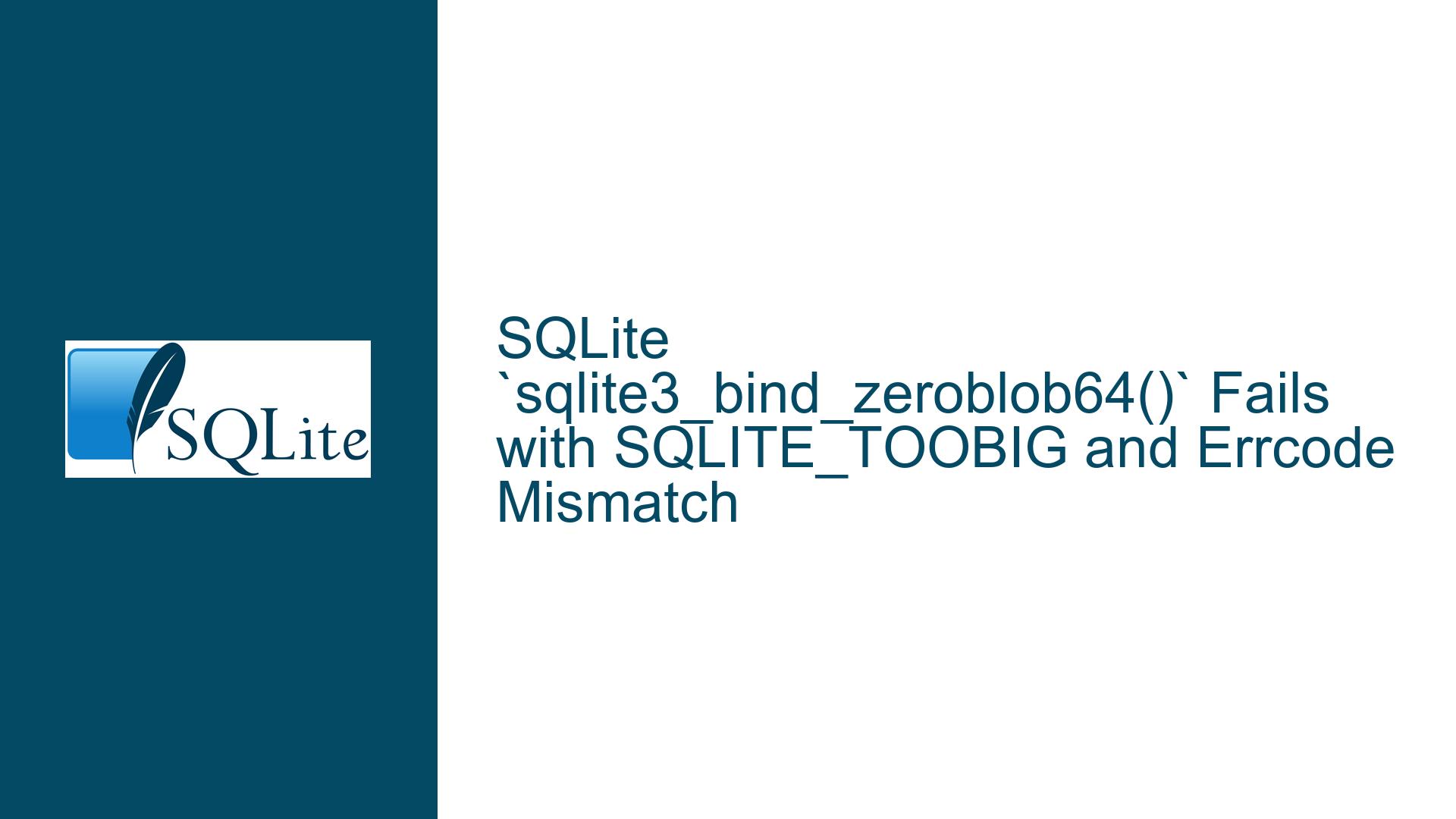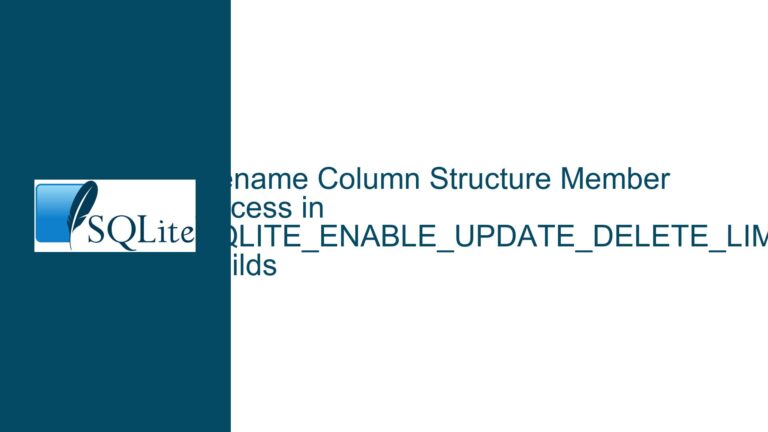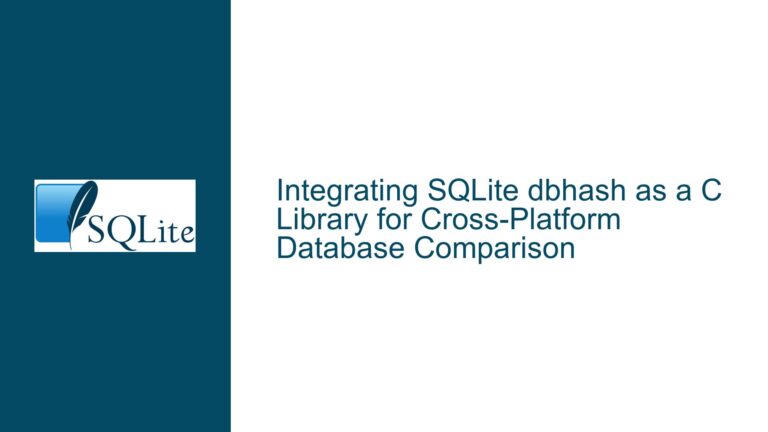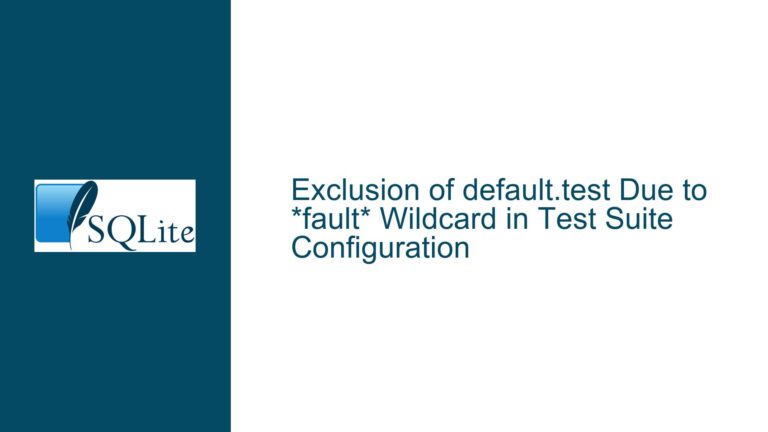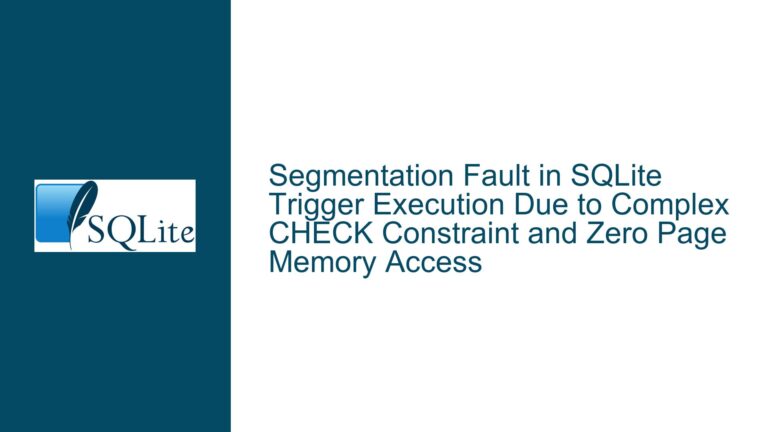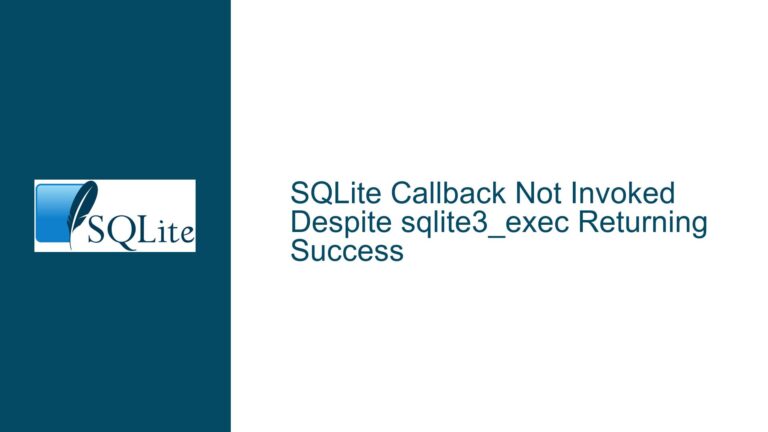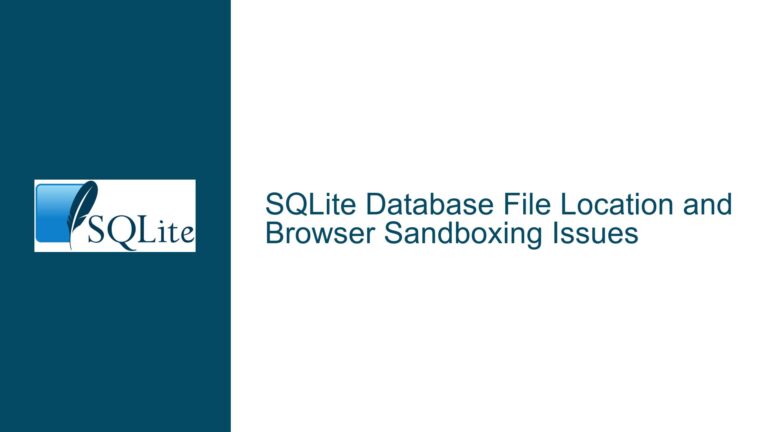SQLite `sqlite3_bind_zeroblob64()` Fails with SQLITE_TOOBIG and Errcode Mismatch
Issue Overview: sqlite3_bind_zeroblob64() Fails with SQLITE_TOOBIG and Errcode Mismatch
The core issue revolves around the behavior of the sqlite3_bind_zeroblob64() function in SQLite, which is used to bind a zero-filled BLOB of a specified size to a prepared statement. When this function is called with a size that exceeds the maximum allowable limit, it returns the SQLITE_TOOBIG error code, indicating that the requested BLOB size is too large. However, despite this error, the subsequent calls to sqlite3_errcode() and sqlite3_errmsg() do not return the expected error code or message. Instead, sqlite3_errmsg() returns "not an error", which contradicts the actual failure of the sqlite3_bind_zeroblob64() call.
This behavior is particularly problematic because it violates the documented contract of the SQLite API. According to the SQLite documentation, if the most recent API call associated with a database connection fails, sqlite3_errcode() should return the numeric result code or extended result code for that API call. In this case, the SQLITE_TOOBIG error code should be returned by sqlite3_errcode(), and the corresponding error message should be provided by sqlite3_errmsg(). However, the observed behavior suggests that the db->errCode is not being set correctly by the sqlite3_bind_zeroblob64() function, leading to the discrepancy between the actual error and the reported error.
The issue was initially reported in 2020, and a response from Richard Hipp in 2021 suggested that the problem might have been addressed in a later version of SQLite. Specifically, he recommended testing the issue with SQLite check-in 56ff58c0b8905aa1 or later, or using the latest prerelease snapshot, to determine if the issue persists. This indicates that the problem might have been a bug in the SQLite implementation that was subsequently fixed.
Possible Causes: Why sqlite3_bind_zeroblob64() Fails to Set db->errCode
The root cause of this issue lies in the internal implementation of the sqlite3_bind_zeroblob64() function and how it handles error reporting. When sqlite3_bind_zeroblob64() is called, it performs several checks to ensure that the requested BLOB size is within the allowable limits. If the size exceeds the maximum limit, the function should return SQLITE_TOOBIG and set the db->errCode to reflect this error. However, the observed behavior suggests that the function is not setting db->errCode correctly, which leads to the mismatch between the actual error and the reported error.
One possible explanation for this behavior is that the sqlite3_bind_zeroblob64() function might be bypassing the standard error-handling mechanism used by other SQLite API functions. Typically, when an error occurs in an SQLite API call, the function sets the db->errCode to the appropriate error code, which can then be retrieved using sqlite3_errcode(). However, in the case of sqlite3_bind_zeroblob64(), it appears that the function is not updating db->errCode as expected, which results in sqlite3_errcode() returning an incorrect or default value.
Another possible cause is that the sqlite3_bind_zeroblob64() function might be using a different error-handling mechanism that does not interact correctly with the standard SQLite error-reporting functions. For example, the function might be setting an internal error flag or returning an error code directly without updating db->errCode. This would explain why sqlite3_errcode() does not return the expected SQLITE_TOOBIG error code, even though the function call itself fails with that error.
Additionally, the issue might be related to the specific version of SQLite being used. The initial report was made in 2020, and the response from Richard Hipp in 2021 suggested that the problem might have been fixed in a later version. This implies that the issue could have been a bug in the SQLite implementation that was subsequently addressed in a later release. Therefore, using an older version of SQLite might result in this error, while updating to a newer version could resolve the issue.
Troubleshooting Steps, Solutions & Fixes: Resolving the sqlite3_bind_zeroblob64() Error Mismatch
To address the issue of sqlite3_bind_zeroblob64() failing with SQLITE_TOOBIG and the subsequent mismatch in error reporting, several troubleshooting steps and solutions can be implemented. These steps are designed to help identify the root cause of the problem and provide potential fixes to ensure that the function behaves as expected.
Step 1: Verify the SQLite Version
The first step in troubleshooting this issue is to verify the version of SQLite being used. As mentioned in the response from Richard Hipp, the issue might have been fixed in SQLite check-in 56ff58c0b8905aa1 or later. Therefore, it is essential to check the version of SQLite and ensure that it is up to date. If an older version of SQLite is being used, updating to the latest version or the recommended check-in might resolve the issue.
To check the version of SQLite, you can use the following SQL command:
SELECT sqlite_version();
This command will return the version of SQLite currently in use. If the version is older than the recommended check-in, you should update SQLite to the latest version or the specific check-in that addresses the issue.
Step 2: Test with the Latest Prerelease Snapshot
If updating to the latest stable version of SQLite does not resolve the issue, the next step is to test the behavior with the latest prerelease snapshot. The prerelease snapshot might include fixes or changes that address the issue with sqlite3_bind_zeroblob64(). By testing with the prerelease snapshot, you can determine if the issue has been resolved in the development version of SQLite.
To obtain the latest prerelease snapshot, you can visit the SQLite website and download the snapshot from the source code repository. Once downloaded, you can compile and link the snapshot with your application to test the behavior of sqlite3_bind_zeroblob64().
Step 3: Implement Custom Error Handling
If updating SQLite or testing with the prerelease snapshot does not resolve the issue, you can implement custom error handling to work around the problem. Since the sqlite3_bind_zeroblob64() function is not setting db->errCode correctly, you can manually check the return value of the function and handle the SQLITE_TOOBIG error accordingly.
For example, you can modify your code to check the return value of sqlite3_bind_zeroblob64() and handle the error explicitly:
int rc = sqlite3_bind_zeroblob64(stmt, index, size);
if (rc == SQLITE_TOOBIG) {
// Handle the error, e.g., log the error or return an error code
fprintf(stderr, "Error: Requested BLOB size is too large.\n");
return rc;
} else if (rc != SQLITE_OK) {
// Handle other errors
fprintf(stderr, "Error: %s\n", sqlite3_errmsg(db));
return rc;
}
By implementing custom error handling, you can ensure that the SQLITE_TOOBIG error is handled correctly, even if sqlite3_errcode() and sqlite3_errmsg() do not return the expected values.
Step 4: Review the SQLite Source Code
If the issue persists and you have access to the SQLite source code, you can review the implementation of sqlite3_bind_zeroblob64() to understand why db->errCode is not being set correctly. By examining the source code, you can identify any discrepancies or bugs in the error-handling logic and potentially apply a patch or workaround.
To review the source code, you can download the SQLite source code from the official website and navigate to the implementation of sqlite3_bind_zeroblob64(). Look for the section of the code that handles the SQLITE_TOOBIG error and verify whether db->errCode is being set correctly. If you identify any issues, you can modify the code and recompile SQLite to apply the fix.
Step 5: Report the Issue to the SQLite Development Team
If none of the above steps resolve the issue, you can report the problem to the SQLite development team. By providing a detailed description of the issue, along with steps to reproduce it, you can help the development team identify and fix the problem in a future release of SQLite.
To report the issue, you can use the SQLite forum or the official bug tracking system. Be sure to include the following information in your report:
- The version of SQLite being used
- A detailed description of the issue, including the observed behavior and expected behavior
- Steps to reproduce the issue
- Any relevant code snippets or error messages
By reporting the issue, you contribute to the ongoing development and improvement of SQLite, ensuring that the problem is addressed for all users.
Conclusion
The issue with sqlite3_bind_zeroblob64() failing with SQLITE_TOOBIG and the subsequent mismatch in error reporting is a complex problem that requires careful troubleshooting. By verifying the SQLite version, testing with the latest prerelease snapshot, implementing custom error handling, reviewing the source code, and reporting the issue to the SQLite development team, you can identify and resolve the problem effectively. These steps ensure that the function behaves as expected and that errors are reported correctly, maintaining the integrity and reliability of your SQLite-based applications.
